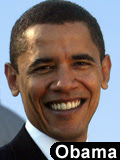 Gov. Bill Richardson’s performance at Wednesday’s Democratic presidential candidate debate was overshadowed by the assertions of others that some of his claims were unrealistic and disingenuous.
Gov. Bill Richardson’s performance at Wednesday’s Democratic presidential candidate debate was overshadowed by the assertions of others that some of his claims were unrealistic and disingenuous.
To top it off, it was John Edwards, not Richardson, who most convincingly set himself apart from the frontrunners on the issue of troop withdrawal from Iraq.
The night started off well for Richardson because the moderator of the MSNBC debate, Tim Russert, asked the frontrunners whether they would promise that, if they were elected, there would be no American troops in Iraq by the end of their first term in January 2013.
The question appeared to be driven by Richardson’s recent attacks on the frontrunners for rejecting his plan for the withdrawal of all American troops, including residual troops, in a matter of months. Richardson has repeatedly said Edwards, Barack Obama and Hillary Clinton aren’t being honest with the American people when they say they would end the war but also plan to leave some troops in Iraq.
All three refused to make the promise. That could have provided an opportunity for Richardson but, even before the governor had a chance to speak, Edwards stole his thunder. The former senator said he would leave only 3,500 to 5,000 non-combat soldiers in Iraq to protect the embassy and American humanitarian workers. He attacked Clinton, saying the “fundamental difference” between their plans is that she would leave some combat troops, and he would not. Edwards argued that leaving combat troops was continuing the war.
When Richardson got the chance to speak, he gave the same answer he’s pushed for weeks – that the frontrunners, in leaving even residual troops, would be continuing the war, and that his plan has a “fundamental difference.” He made his point, but Edwards had already set himself apart.
Things got better for Edwards and worse for Richardson. Obama was suffering from a cold and had an off night, and Clinton had a hard time clearly answering questions. Edwards plainly answered each question that was asked, appearing straight-forward and sharp.
A botched answer
Russert asked tough questions of several of the candidates. He pointed out the security breaches at Los Alamos National Laboratory while Richardson was energy secretary and the governor’s recent misstatements on the campaign trail, which included mistakenly saying that homosexuality is a choice. Russert asked, “Based on those kinds of comments and that record of performance or questionable activities, how can you tell people you have the experience to be president?”
Richardson said he does make mistakes, but he admits them. He said the real issue, however, is whether he delivers, and that’s when his answer went downhill. He pointed to his experience in meeting with foreign dictators and said he negotiated a ceasefire in Darfur earlier this year. The reality is that, despite his trip, a ceasefire never happened.
He also said New Mexico has a balanced budget, implying that he gets credit for that. The reality is that the state Constitution requires it. It’s not an option.
Then Richardson repeated the line that earned him a great deal of positive attention after a recent debate in Iowa, saying Clinton may be the candidate of experience, and Obama may be the candidate of change, but with him, voters get both. The campaign has milked the clever line for all its worth in recent weeks, and this time it came across as cheap.
What goes around…
Then Edwards and Obama got back at Richardson for his recent and relentless assertion that they’re not being honest with the American people about their plans for Iraq.
Candidates were asked if they would ensure the solvency of social security by lifting the cap on the tax that kicks in at an income of $97,500. Richardson said he would not, but would ensure the continuance of the program by growing the nation’s economy. When Russert pointed out that estimates indicate the number of people on social security is going to double, and suggested that Richardson’s assertion that economic development alone could pay for the increased costs was outrageous, the governor refused to waver.
 Edwards seized the moment, saying the only way to run for president “is to be honest.”
Edwards seized the moment, saying the only way to run for president “is to be honest.”
“You cannot solve this problem just by growing the economy,” Edwards said before adding that “there has been so much doubletalk on this issue.”
No other candidate agreed with Richardson on the social security question, just as no other candidate – except Dennis Kucinich and Mike Gravel – believes Richardson’s timetable for Iraq withdrawal is realistic or logistically possible. When Richardson turned another question back to Iraq moments later, Obama took the opportunity to point that out.
 Richardson was asked if, given the group’s stance on homosexuality, he would accept the position of honorary chairman of the Boy Scouts of America – a title usually given to the president – if he was elected. Richardson said he would not. He then somehow got back on the subject of Iraq and again attacked the frontrunners. Obama cut in.
Richardson was asked if, given the group’s stance on homosexuality, he would accept the position of honorary chairman of the Boy Scouts of America – a title usually given to the president – if he was elected. Richardson said he would not. He then somehow got back on the subject of Iraq and again attacked the frontrunners. Obama cut in.
“You know, I’m happy to have this discussion again, Bill,” Obama said. “I think it is important to tell the American people the truth.”
He said generals don’t believe it’s logistically possible to safely withdraw American soldiers as quickly as Richardson proposes, and said Richardson’s plan is not realistic.
“It’s the same pretense with social security that somehow we can do this magically. We can’t,” Obama said.
Though candidates were allowed some back-and-forth and Richardson likely could have challenged Edwards and Obama, he did not. Richardson pointed out during a post debate interview that Obama “challenged me” and “got irritated with me,” but even then, he didn’t really respond.
All that added up to a fairly unmemorable performance by a candidate who appeared to be marginalized by Russert’s tough questions and the challenges from Edwards and Obama.
You can watch the debate by clicking here.
 Gov. Bill Richardson’s performance at Wednesday’s Democratic presidential candidate debate was overshadowed by the assertions of others that some of his claims were unrealistic and disingenuous.
Gov. Bill Richardson’s performance at Wednesday’s Democratic presidential candidate debate was overshadowed by the assertions of others that some of his claims were unrealistic and disingenuous.  Edwards seized the moment, saying the only way to run for president “is to be honest.”
Edwards seized the moment, saying the only way to run for president “is to be honest.”
